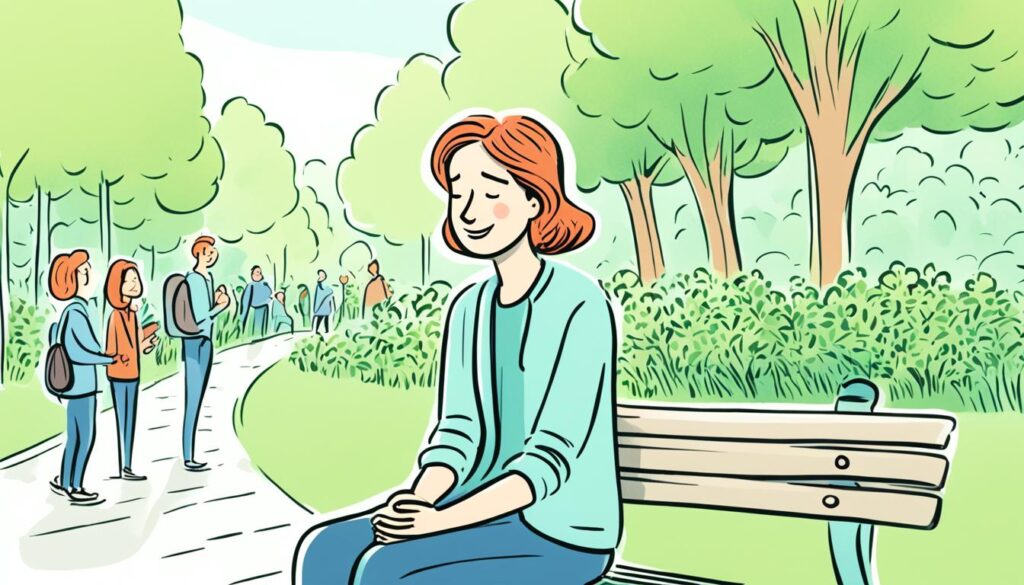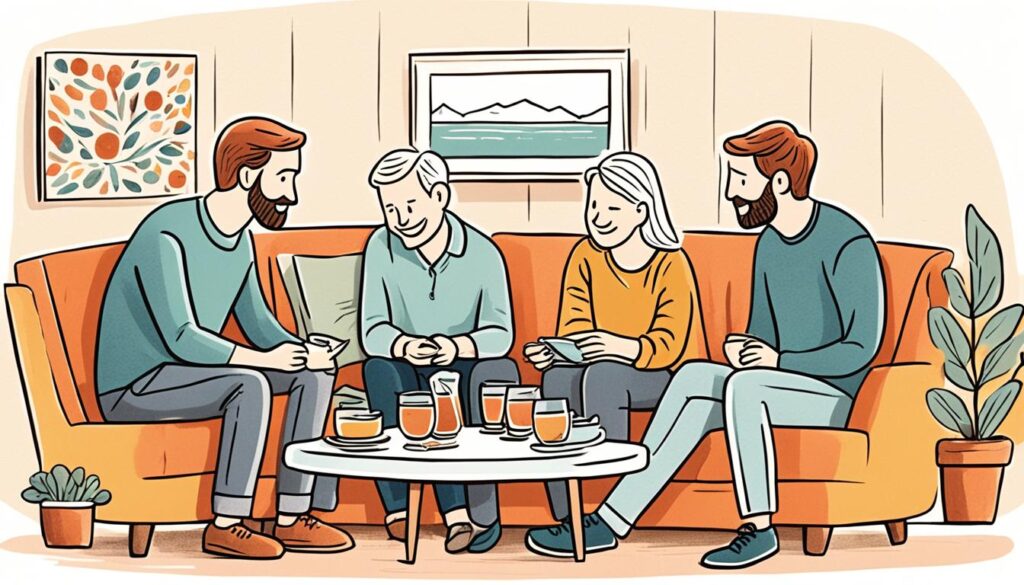When you think of introverts, the image that often comes to mind is of quiet and reserved individuals who prefer their own company. But have you ever wondered if there’s more to introverts than meets the eye? Are introverts protective in some way? And if so, how does their protective nature manifest? So let’s see the ways in which introverts guard their boundaries, preserve their energy, and prioritize self-care.
Many introverts have an innate instinct to protect themselves and their energy levels. This protective nature stems from their need for solitude and quiet, which allows them to recharge and rejuvenate. Rather than seeing it as a weakness, the protective nature of introverts can be viewed as a strength, enabling them to navigate the world in a way that aligns with their introverted nature.
Key Takeaways:
- Introverts have a natural instinct to protect themselves and their energy levels.
- This protective nature stems from their need for solitude and quiet, which allows them to recharge and rejuvenate.
- Introverts are often more self-aware and in tune with their emotional needs, leading them to prioritize self-care and self-preservation.
- Introverts may be more prone to defense mechanisms such as withdrawal or setting boundaries to protect their inner world from external stimuli.
- Their protective instincts manifest in various aspects of their lives, including relationships, social interactions, and personal boundaries.
Introverts Protect Their Energy Levels
One of the primary ways introverts protect themselves is by safeguarding their energy levels. Social interaction can be draining for introverts, as they process information more deeply and require time to recharge. While extroverts might thrive in large social gatherings, introverts often feel overwhelmed and prefer smaller, intimate gatherings or one-on-one conversations.
Introverts recognize the importance of setting boundaries to protect their energy. They may limit the amount of time they spend socializing to ensure they have enough alone time to recharge and take care of their emotional well-being. By setting specific times for social engagements or politely declining invitations when they need to prioritize self-care, introverts can maintain a healthy balance.
The communication style of introverts also differs from extroverts. Instead of dominating conversations, introverts tend to listen actively and speak thoughtfully, using their energy sparingly. They may prefer deeper, meaningful conversations over small talk, as it allows them to connect on a more profound level.
It is essential for introverts to find a balance between social interactions and alone time to protect their energy levels. This balance helps maintain their emotional well-being and allows them to thrive in their interactions with others.
They Keep a Tight Circle of Trust
Introverts have a unique approach to relationships, preferring to keep a small but close-knit circle of friends. Rather than focusing on quantity, introverts value the quality of their relationships, prioritizing deep connections and meaningful interactions.
For introverts, trust and emotional intelligence play pivotal roles in building and maintaining relationships. They invest their time and energy in nurturing bonds with individuals who understand and appreciate their need for solitude and respect their boundaries. Trust forms the foundation of these connections, allowing introverts to feel comfortable and secure in expressing themselves.
Unlike extroverts who may thrive in large social gatherings, introverts often feel more at ease spending time with a few close friends. These individuals provide the support and understanding introverts need for their emotional well-being. Examples of deep connections for introverts include a best friend who truly understands their introverted nature or a small group of trusted individuals with whom they can share their thoughts and feelings.
Intimacy and vulnerability are significant aspects of introvert relationships. Introverts cherish authenticity and meaningful conversations, provoking deep connections with those they trust. Their preference for quality over quantity ensures that their relationships are built on a solid foundation of trust and mutual understanding.
“I value my small group of friends who understand my introverted nature. We have deep conversations and provide support and understanding to each other. Trust is crucial in these relationships, as it allows us to be vulnerable and authentic with one another.”
Benefits of a Small Circle of Trust
- Deeper connections and understanding
- Support and emotional security
- Ability to be vulnerable and authentic
- Less social pressure and stress
| Introverts | Extroverts |
|---|---|
| Prefer small, close-knit circles of friends | Thrives in large social gatherings |
| Value quality of relationships | Focus on quantity of relationships |
| Build trust and intimacy | Thrives on social interactions |
By surrounding themselves with individuals who support and uplift them, introverts protect their emotional well-being and maintain a sense of security. Their small circle of trust allows them to navigate their social lives with greater ease and ensures that their relationships are fulfilling and meaningful.

Introverts Screen Out the Noise
Introverts have a natural inclination to seek solitude and quietude, allowing them to screen out unnecessary noise and distractions. Choosing calm and peaceful settings, they create environments with minimal sensory overload. Noise, whether external or internal, can be overwhelming for introverts, prompting them to retreat to quieter spaces to regain their balance.
By removing themselves from excessive noise and distractions, introverts are able to engage in self-reflection and introspection. Peaceful surroundings provide them with the opportunity to focus on their thoughts, recharge their energy, and find inspiration. Engaging in solitary activities such as reading, writing, or pursuing hobbies gives introverts a sense of serenity and creative fulfillment.
Solitude and quietude play a significant role in the protective nature of introverts. These moments of stillness and peace allow them the space for self-discovery and personal growth.
For example, imagine an introvert sitting in a cozy reading nook, surrounded by walls adorned with their favorite books. The room is bathed in soft, natural light that enters through a nearby window. As they delve into the pages of a novel, their mind immerses itself in the story, undisturbed by external noise or distractions. This tranquil setting provides the introvert with the perfect environment for self-reflection, deep thinking, and the exploration of new ideas.
Noise Levels Comparison
| Environment | Noise Level |
|---|---|
| Busy coffee shop | High |
| Public library | Low |
| Quiet park | Very low |
Being in a bustling coffee shop with the constant chatter and clinking of coffee cups can create a sensory overload for introverts, making it difficult for them to focus. On the other hand, a public library, with its hushed tones and respectful silence, provides a more peaceful environment for introverts who seek solitude and concentration.
Ultimately, introverts understand the importance of finding and creating serene spaces. These spaces allow them to protect their energy, engage in self-reflection, and cultivate a sense of peace amidst the noise and distractions of the world.
Selective Sharing: A Superpower
Introverts have a unique way of navigating their social interactions by selectively choosing what they share with others. This intentional approach allows them to utilize emotional boundaries, safeguard their inner world, and protect their emotional well-being.
Unlike extroverts who may openly express their thoughts and feelings, introverts may be more hesitant to disclose personal information or vulnerabilities. Instead, they prioritize establishing trust and a sense of comfort before opening up to others. This cautious approach ensures that their vulnerability is respected and valued by the individuals they choose to confide in.
Selective sharing is a superpower that introverts possess. It empowers them to control the narrative of their lives and maintain a sense of privacy. By carefully choosing whom they share with, introverts can preserve their emotional boundaries and prevent their thoughts, ideas, and feelings from being exploited or misunderstood.
Emotional boundaries are essential for introverts as they protect their inner world and autonomy. It allows introverts to maintain a sense of individuality and authenticity while forming deep and meaningful connections. By being selective in sharing, introverts prioritize their emotional well-being and ensure that their innermost self is safeguarded.
This ability to selectively share empowers introverts to curate their social interactions and prioritize self-care. It allows them to manage their emotional well-being and maintain a healthy balance between their internal world and external relationships.
Through the superpower of selective sharing, introverts can create the necessary emotional boundaries to protect their inner world, their privacy, and their overall well-being.

| Benefits of Selective Sharing |
|---|
| 1. Preservation of privacy |
| 2. Protection of emotional well-being |
| 3. Maintaining control over personal narrative |
| 4. Ensuring vulnerability is respected and valued |
| 5. Establishing emotional boundaries |
Guarding Their Inner Sanctum
Introverts value their personal space and establish boundaries to protect their inner sanctum. They understand the importance of having a space where they can retreat to and be alone with their thoughts and emotions. This personal space extends beyond physical proximity and includes emotional boundaries as well. It allows introverts to create a sense of safety and security, where they can fully be themselves without external pressures or distractions.
For introverts, alone time is not just a preference, but a necessity for their well-being. It is during these moments of solitude that they recharge their energy and process their thoughts and experiences. Whether it’s reading a book, going for a walk, or simply enjoying their own company, alone time helps introverts maintain their emotional balance and clarity.
Example: Imagine an introvert coming home after a long day of social interactions. They close the door behind them and instantly feel a sense of relief. Their personal space becomes their sanctuary, where they can unwind and be completely themselves. This time alone allows them to recharge and regain their energy, preparing them for the next day’s challenges.
Setting boundaries is another way introverts protect themselves. They establish clear guidelines for social interactions, such as limiting the number of commitments or balancing group activities with alone time. By doing so, introverts ensure that their energy is protected and that they have enough time and space for self-care and self-reflection.
Example: An introvert may decide to attend a social event but set a specific time limit for their participation. They communicate this boundary to others, allowing them to make a graceful exit when they start to feel overwhelmed or drained. This boundary-setting ensures that the introvert’s needs are respected and prevents them from experiencing burnout.
In honoring their personal space and boundaries, introverts are able to strike a harmonious balance between their social connections and their need for solitude. They understand that by guarding their inner sanctum, they can protect their emotional well-being and maintain a thriving inner world.
Introverts: Masters of Self-Preservation
Introverts possess a remarkable ability to recognize and respond to their needs, making them masters of self-preservation. They understand the importance of prioritizing self-care and emotional well-being to avoid burnout and exhaustion. By tuning into their instincts, introverts know when it’s time to take a step back or seek solitude to recharge and rejuvenate.
Introverts engage in activities that align with their values and interests, ensuring they invest their time and energy in meaningful pursuits. For example, they may choose to spend an evening curled up with a good book rather than attending a crowded social event. By tuning into their inner desires, introverts protect their emotional, mental, and spiritual well-being.
Self-preservation for introverts goes beyond just physical needs. It encompasses their overall emotional well-being and mental clarity. Taking care of their inner world allows introverts to navigate the demands of daily life more effectively, leading to a more balanced and fulfilling existence.

Protecting introvert needs requires a deep understanding of oneself and the courage to prioritize personal well-being. By recognizing and responding to their needs and instincts, introverts create a foundation for a thriving and sustainable life. Whether it’s engaging in solitary activities, setting boundaries, or investing in self-reflection, introverts demonstrate their commitment to self-preservation and holistic growth.
| Introvert Self-Preservation | Introvert Survival Skills | Introvert Self-Care | Introvert Emotional Well-Being | Introverts and Instincts | Protecting Introvert Needs |
|---|---|---|---|---|---|
| Recognizing and responding to personal needs | Engaging in meaningful activities aligned with values and interests | Prioritizing self-care practices | Cultivating emotional balance and stability | Tuning into inner instincts and intuition | Setting boundaries and honoring personal well-being |
| Investing in alone time for reflection and recharge | Building resilience and adaptability | Nurturing mental and physical health | Fostering a sense of overall contentment | Trusting inner guidance and decision-making | Creating a supportive and nurturing environment |
| Practicing stress management techniques | Developing effective coping strategies | Seeking balance and harmony in daily life | Embracing vulnerability and authenticity | Embracing solitude as a source of strength | Advocating for personal needs and wants |
By mastering the art of self-preservation, introverts can navigate the world with confidence, authenticity, and a profound sense of well-being. Their ability to protect their needs and prioritize their emotional health serves as an inspiration for others to embrace their own self-care practices and inner instincts.
Avoiding Drama, One Step at a Time
Drama and conflict can be overwhelming for introverts, as they value peace and harmony in their lives. Instead of seeking out drama, introverts actively avoid situations or relationships that are prone to conflict. By doing so, they strive to create peaceful environments that contribute to their emotional well-being.
“I have learned that avoiding drama and conflicts is essential for my well-being. It allows me to maintain my inner peace and focus on what truly matters to me.”
Introverts are adept at conflict management and approach disagreements with empathy and thoughtful communication. They prioritize maintaining emotional well-being and will go to great lengths to preserve their inner peace. This approach not only benefits introverts but also contributes to creating peaceful and harmonious relationships with others.
By avoiding drama, introverts can focus their energy on personal growth and fostering meaningful connections. They understand that conflicts drain their energy and impact their emotional well-being. Instead of engaging in unnecessary conflicts, introverts choose peaceful resolutions and prioritize their own well-being.
| Conflict Management Strategies for Introverts | Benefits |
|---|---|
| 1. Active listening | – Establishes empathy and understanding – Reduces misunderstandings |
| 2. Thoughtful communication | – Promotes clarity – Reduces potential conflicts – Encourages constructive dialogue |
| 3. Choosing battles wisely | – Preserves energy and emotional well-being – Avoids unnecessary conflicts – Allows focus on personal growth |
| 4. Seeking peaceful resolutions | – Fosters harmonious relationships – Promotes emotional well-being – Maintains inner peace |
By actively avoiding drama and conflict, introverts create a peaceful and supportive environment that nurtures their emotional well-being. This approach allows them to thrive in their own unique way, focusing on personal growth, meaningful connections, and a life of tranquility.
Valuing Quality Over Quantity
Introverts prioritize quality relationships over a large social circle. They understand the importance of deep connections and meaningful experiences in their lives. Rather than seeking validation from a wide network of acquaintances, introverts focus on nurturing and deepening existing relationships that align with their values.
“I would rather have four quarters than a hundred pennies.” – Anonymous
The concept of quality relationships extends beyond surface-level interactions. Introverts appreciate the value of cultivating meaningful connections by investing their time and energy into close friendships and intimate partnerships.
Similar to their preference for simplicity and minimalism in material possessions, introverts value simplicity and meaningful experiences in their relationships. They find fulfillment in authentic conversations, shared interests, and mutual understanding.
By prioritizing quality over quantity, introverts protect their emotional well-being. They create a life centered around authenticity and purpose rather than chasing superficial social dynamics.
Example:
Imagine a group of friends planning a weekend getaway. While extroverts may strive to invite as many people as possible, introverts would carefully select a small group of individuals they feel connected to and trust. This enables a more intimate and meaningful experience for everyone involved. The focus is on forging lasting memories and deepening the existing relationships, rather than simply adding numbers or collecting acquaintances.

Introverts and Quality Relationships
| Introvert Preferences | Benefits |
|---|---|
| Prioritizing deep connections | Enhanced emotional support and understanding |
| Nurturing existing relationships | Building stronger bonds and creating meaningful memories |
| Focusing on authenticity | Creating a sense of trust and genuine connection |
| Choosing quality over quantity | Protecting emotional well-being and avoiding superficial relationships |
Introverts: Curators of Their Own Experiences
As an introvert, you have the power to shape your own narrative and curate your own experiences. Unlike extroverts who thrive in social settings and seek constant external stimulation, introverts prioritize their autonomy and value self-expression in a way that aligns with their introverted nature.
One of the defining characteristics of introverts is their strong sense of individuality. They embrace their unique perspective on life and appreciate the power of authenticity. Instead of conforming to societal expectations, introverts carve their own path and make choices that reflect their true identity.
By curating their experiences, introverts create opportunities for personal growth and self-reflection. They are intentional about the type of social interactions they engage in and the activities they pursue. This allows introverts to protect their emotional well-being and live a life that is true to their values and aspirations.
For example, an introvert might choose to attend a small literary club instead of a crowded party, where they can engage in deep conversations and foster meaningful connections. They might also spend time alone in nature, reflecting on their thoughts and experiences, or pursue creative endeavors that allow them to express their inner world.
Ultimately, introverts are the curators of their own experiences, taking ownership of their narrative and contributing to their own personal growth. By embracing their autonomy, self-expression, and individuality, introverts can navigate the world in a way that aligns with their introverted nature and leads to a fulfilling and authentic life.
FAQ
Are introverts protective?
Yes, introverts have a natural instinct to protect themselves and their energy levels. This protective nature stems from their need for solitude and quiet, which allows them to recharge and rejuvenate. Introverts are often more self-aware and in tune with their emotional needs, leading them to prioritize self-care and self-preservation. They may employ defense mechanisms such as setting boundaries or withdrawing to safeguard their inner world from external stimuli.
How do introverts protect their energy levels?
One of the primary ways introverts protect themselves is by safeguarding their energy levels. Social interaction can be draining for introverts, so they are often more comfortable with smaller, intimate gatherings or one-on-one conversations. They may limit the time they spend socializing to ensure they have enough alone time to recharge and take care of their emotional well-being. Introverts may also establish boundaries in social situations to protect their energy, such as setting specific times for social engagements or politely declining invitations when they need to prioritize self-care.
How do introverts maintain relationships?
Introverts tend to have a smaller circle of friends or a tight-knit group of individuals with whom they feel comfortable and trust. They value quality over quantity in their relationships, prioritizing deep connections and meaningful interactions. While it may take them longer to open up to others, introverts invest their time and energy in building trustworthy relationships. They surround themselves with individuals who support and uplift them, and they enjoy spending time with their close friends rather than engaging in large social gatherings.
How do introverts handle noise and distractions?
Introverts have a natural inclination to seek solitude and quietude, allowing them to screen out unnecessary noise and distractions. They may prefer calm and peaceful settings, as excessive noise and distractions can be overwhelming. By removing themselves from these stimuli, introverts are better able to engage in self-reflection and introspection. They enjoy engaging in solitary activities that provide a sense of serenity and creative fulfillment, such as reading, writing, or pursuing hobbies.
How do introverts handle sharing personal information?
Introverts are selective in what they choose to share with others, utilizing emotional boundaries to protect their inner world. They may be hesitant to disclose personal information or feelings unless they have established trust and feel comfortable with the other person. Selective sharing is a superpower for introverts, allowing them to manage their emotional well-being and maintain a sense of privacy. By carefully choosing whom to confide in, introverts can ensure their vulnerability is respected and valued.
How do introverts establish and maintain personal boundaries?
Introverts value their personal space and establish boundaries to protect their inner sanctum. They often need alone time to process their thoughts, recharge, and reflect on their experiences. Setting boundaries allows introverts to protect their energy, emotional well-being, and mental clarity. They may establish clear guidelines for social interactions, such as limiting commitments or balancing group activities with alone time. Honoring personal space and boundaries enables introverts to create a harmonious balance between their social connections and their need for solitude.
How do introverts prioritize self-preservation?
Introverts have an innate ability to recognize and respond to their needs, making them masters of self-preservation. They prioritize self-care and emotional well-being, understanding that neglecting their needs can lead to burnout and exhaustion. Introverts are skilled at tuning into their instincts and knowing when to take a step back or seek solitude to recharge. They engage in activities that align with their values and interests, ensuring they are investing their time and energy in meaningful pursuits.
How do introverts avoid drama and conflicts?
Drama and conflict can be overwhelming for introverts, as they value peace and harmony in their lives. They actively avoid situations or relationships that are prone to drama and strive to create peaceful environments. Introverts are adept at conflict management and often approach disagreements with empathy and thoughtful communication. By avoiding drama, introverts can focus their energy on personal growth and meaningful connections rather than engaging in unnecessary conflicts.
How do introverts value relationships?
Introverts place a high value on quality relationships, prioritizing deep connections over a large social circle. They often embrace a minimalist mindset, preferring simplicity and meaningful experiences over material possessions. Introverts find fulfillment in cultivating meaningful connections and investing their time and energy into relationships that align with their values. By valuing quality over quantity, introverts are able to protect their emotional well-being and create a life centered around authenticity and purpose.
How do introverts curate their own experiences?
Introverts take control of their narrative by curating their own experiences and consciously choosing how they engage with the world. They value their autonomy and prioritize self-expression in a way that aligns with their introverted nature. Introverts have a unique perspective on life and embrace their individuality, appreciating the power of authenticity. By curating their experiences, introverts create opportunities for personal growth and deep self-reflection, contributing to their own personal development and well-being.